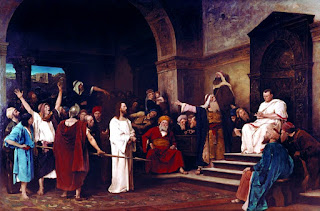Amazed
Read Mark 15:1-20.
Morning has come, and it's time to formalize what was already decided the night before. The Jewish ruling council has been stripped of any real authority by Rome, so to carry out the sentence they want, they have to get approval from Pilate, the Roman governor. Pilate, from all accounts, was not a nice man any more than Herod was. Pilate despised the Jews, as did most Roman rulers, and he didn't spend any more time in Jerusalem than he had to. Often, Pilate governed from Caesarea Maritime, on the Mediterranean Sea, but Passover time always brought him to Jerusalem. He had to be there in case those pesky Jews stirred up any trouble. That meant, of course, it was the perfect time for Jesus' arrest—it was convenient to have all the needed leadership in one place.
So Jesus is sent to Pilate, who interviews him but still basically gets the silence that the religious leaders got. The only time Jesus answers Pilate is when he asks his initial question, and even then his answer really isn't an answer, just an affirmation that Pilate has spoken. Pilate, we are told, is "amazed" by Jesus' silence.
The word Mark uses there indicates wonder, amazement, astonishment or admiration. But what is it, exactly, that Pilate would have to admire about Jesus? Pilate has everything he could want at this point in his life. He has power, luxury, and at least some degree of wealth. He most likely was trained in the best schools and has a good education. He really doesn't have to work all that much for his living. Most of his days would be spent in organized leisure and he might have to sign off on a few projects. Passover would be the time when he was most on edge, because it was also the time when nationalistic spirit would rise among the Jews which could create riots. From an earthly standpoint, he has everything he could want, everything that is desirable in life. This Jesus standing before his has nothing. No money, no power, no position. He is a poor Jew from a backwater country who literally doesn't even have a place to lay his head. The only possessions he has are the clothes on his back, and even those are about to be taken away. Even his followers, that ragtag bunch of fishermen and other nobodies, have all deserted him. He's alone, with nothing to show for his thirty-some years of life.
Why would Pilate admire Jesus? Why would he be amazed at Jesus?
Maybe it's because the Roman system of advancement in career and government often involved betrayal and even death. You were never far from someone turning on you. Pilate had to constantly keep his eyes and ears open. In fact, not long after his encounter with Jesus, Pilate is "recalled" to Rome and disappeared along the way. Rumor is he killed himself along the way rather than risk facing the displeasure of his emperor. Pilate is always on edge. Jesus is not. Jesus comes before him, self-assured, calm, quiet. He does not have the need to defend himself, even though he knows what is coming. He is confident that, come what may, his heavenly Father is using what will happen for his glory.
And Pilate is amazed. Don't you imagine that, deep inside of himself, he wishes he could have the same sort of confidence he sees in Jesus? That's why he admires Jesus, why he is amazed.
So...this day, not standing on trial but going about your daily life: do you have that kind of confidence? Do you know that you know that Christ is on your side, that your heavenly Father is using whatever you're going through for his glory? Stand in that confidence, and having done all you can—stand and be amazed.
Morning has come, and it's time to formalize what was already decided the night before. The Jewish ruling council has been stripped of any real authority by Rome, so to carry out the sentence they want, they have to get approval from Pilate, the Roman governor. Pilate, from all accounts, was not a nice man any more than Herod was. Pilate despised the Jews, as did most Roman rulers, and he didn't spend any more time in Jerusalem than he had to. Often, Pilate governed from Caesarea Maritime, on the Mediterranean Sea, but Passover time always brought him to Jerusalem. He had to be there in case those pesky Jews stirred up any trouble. That meant, of course, it was the perfect time for Jesus' arrest—it was convenient to have all the needed leadership in one place.
So Jesus is sent to Pilate, who interviews him but still basically gets the silence that the religious leaders got. The only time Jesus answers Pilate is when he asks his initial question, and even then his answer really isn't an answer, just an affirmation that Pilate has spoken. Pilate, we are told, is "amazed" by Jesus' silence.
The word Mark uses there indicates wonder, amazement, astonishment or admiration. But what is it, exactly, that Pilate would have to admire about Jesus? Pilate has everything he could want at this point in his life. He has power, luxury, and at least some degree of wealth. He most likely was trained in the best schools and has a good education. He really doesn't have to work all that much for his living. Most of his days would be spent in organized leisure and he might have to sign off on a few projects. Passover would be the time when he was most on edge, because it was also the time when nationalistic spirit would rise among the Jews which could create riots. From an earthly standpoint, he has everything he could want, everything that is desirable in life. This Jesus standing before his has nothing. No money, no power, no position. He is a poor Jew from a backwater country who literally doesn't even have a place to lay his head. The only possessions he has are the clothes on his back, and even those are about to be taken away. Even his followers, that ragtag bunch of fishermen and other nobodies, have all deserted him. He's alone, with nothing to show for his thirty-some years of life.
Why would Pilate admire Jesus? Why would he be amazed at Jesus?
Maybe it's because the Roman system of advancement in career and government often involved betrayal and even death. You were never far from someone turning on you. Pilate had to constantly keep his eyes and ears open. In fact, not long after his encounter with Jesus, Pilate is "recalled" to Rome and disappeared along the way. Rumor is he killed himself along the way rather than risk facing the displeasure of his emperor. Pilate is always on edge. Jesus is not. Jesus comes before him, self-assured, calm, quiet. He does not have the need to defend himself, even though he knows what is coming. He is confident that, come what may, his heavenly Father is using what will happen for his glory.
And Pilate is amazed. Don't you imagine that, deep inside of himself, he wishes he could have the same sort of confidence he sees in Jesus? That's why he admires Jesus, why he is amazed.
So...this day, not standing on trial but going about your daily life: do you have that kind of confidence? Do you know that you know that Christ is on your side, that your heavenly Father is using whatever you're going through for his glory? Stand in that confidence, and having done all you can—stand and be amazed.



Comments
Post a Comment